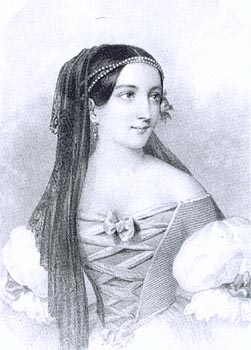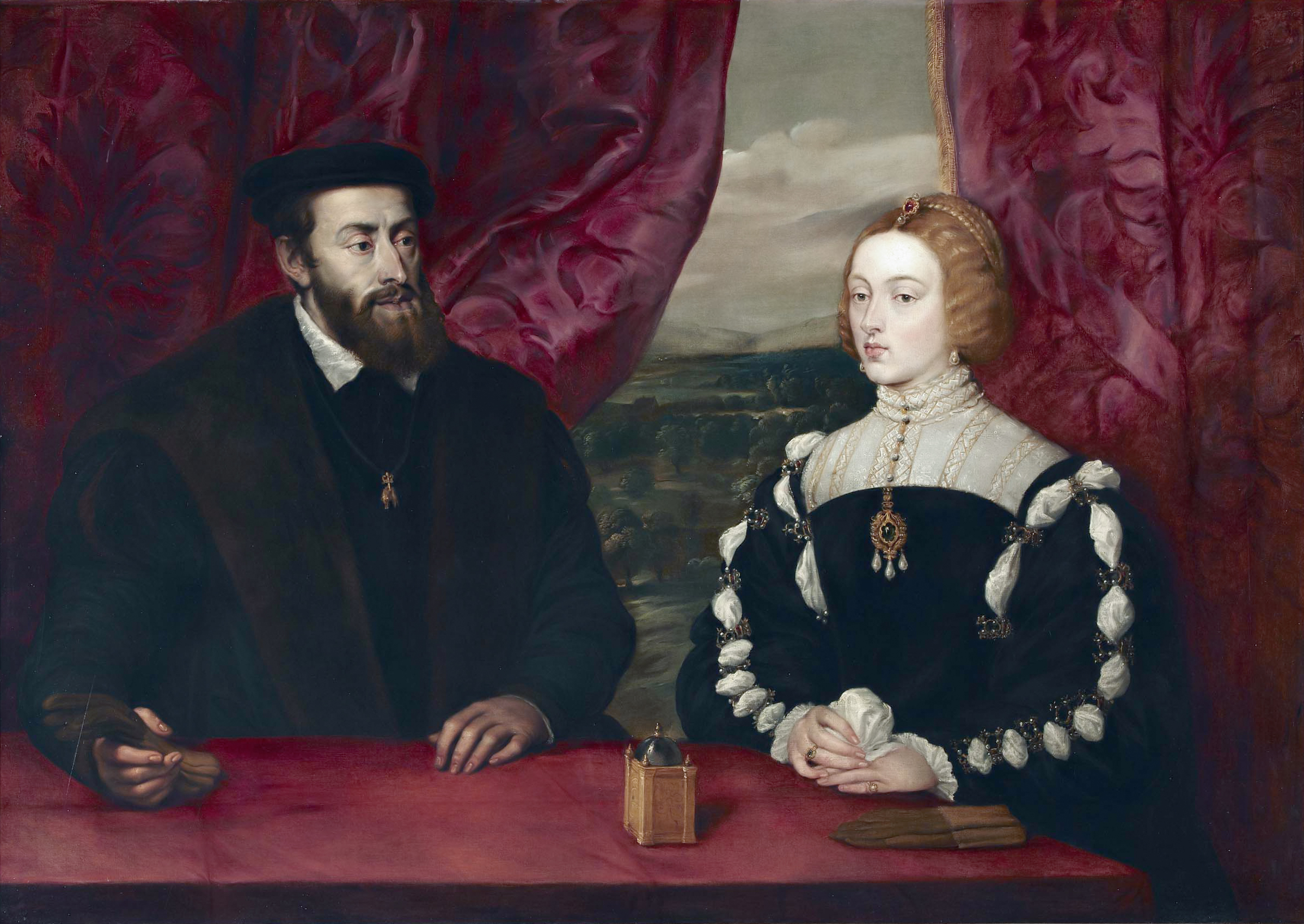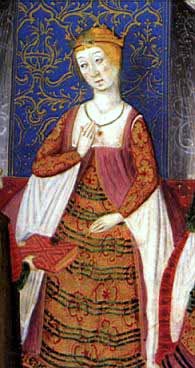|
Queen Isabella (other)
Queen Isabella may refer to: People * Isabella of Hainault (1170–1190), queen consort of France * Isabella I of Jerusalem (1172–1205), queen regnant * Isabella of Angoulême (1188–1246), queen consort England * Isabella II of Jerusalem (1212–1228), queen regnant, also known as Yolande * Isabella of England (1214–1241), queen consort of Germany and of Sicily * Isabella, Queen of Armenia (died 1252), queen regnant * Isabella of Aragon (1247–1271), queen consort of France * Isabella of Ibelin (1241–1324), queen consort of Cyprus * Isabella of Ibelin (1252–1282), queen consort of Cyprus * Elizabeth of Aragon (1271–1336), queen consort of Portugal * Isabella of France (1295–1358), queen consort of England * Isabella of Majorca (1337–1406), titular queen consort * Isabeau of Bavaria (1369–1435), queen consort of France * Isabella of Valois (1389–1409), queen consort of England * Isabella of Portugal, Queen of Castile (1428–1496), queen consort of Castile * I ... [...More Info...] [...Related Items...] OR: [Wikipedia] [Google] [Baidu] |
Isabella Of Hainault
Isabella of Hainault (5 April 1170 – 15 March 1190) (Also spelled: Ysabella de Hainault, Ysabelle de Hainaut or Ysabeau de Hainaut) was a Queen of France as the first wife of King Philip II. She was also formally ruling Countess of Artois ''de jure'' between 1180 and 1190. Early life Isabella was born in Valenciennes on 5 April 1170, the daughter of Baldwin V, Count of Hainaut, and Margaret I, Countess of Flanders. When she was just one year old, her father had her betrothed to Henry, the future Count of Champagne. He was the nephew of Adèle of Champagne, the queen of France. In 1179, both their fathers swore that they would proceed with the marriage, but her father later agreed to her marrying King Philip II. Queen of France Isabella married Philip on 28 April 1180 at Bapaume, and brought as her dowry the county of Artois. The marriage was arranged by her maternal uncle Philip, Count of Flanders, who was advisor to the King. The wedding did not please the queen dowager, ... [...More Info...] [...Related Items...] OR: [Wikipedia] [Google] [Baidu] |
Isabella Of Portugal, Queen Of Castile
Isabella of Portugal (''Isabel'' in Portuguese and Spanish) (1428 – 15 August 1496) was Queen of Castile and León as the second wife of King John II. She was the mother of Queen Isabella I of Castile. Queen Isabella was born as a scion of a collateral branch of the Aviz dynasty that had ruled Portugal since 1385. Her parents were John, Constable of Portugal, the youngest surviving son of John I of Portugal, and his half-niece and wife, Isabella of Barcelos, the daughter of the Duke of Braganza, an illegitimate son of the king. She was married to King John II of Castile as his second wife. His first wife, Maria of Aragon, Queen of Castile, Mary of Aragon, had given him four children, though only one, the future Henry IV of Castile, had survived. Henry had been joined to Blanche II of Navarre in an unconsummated marriage for seven years and was called "El Impotente." Because of this, John decided to seek another wife, preferably with a French princess. However, his trusted ... [...More Info...] [...Related Items...] OR: [Wikipedia] [Google] [Baidu] |
Princess Isabella (other)
Princess Isabella may refer to: * Princess Isabella of Armenia (c. 1278–c. 1321), daughter of Leo III * Princess Isabella of Bavaria (1863–1924) * Princess Amalie Isabella of Bavaria (1921–1985) * Princess Isabel Alfonsa of Bourbon-Two Sicilies (1904–1985) * Isabel, Princess Imperial of Brazil (1846–1921), daughter and heir of Pedro II, Emperor of Brazil * Princess Isabella of Croÿ (1856–1931), wife of Archduke Friedrich, Duke of Teschen * Princess Isabella of Denmark (born 2007), daughter of Crown Prince Frederik and Crown Princess Mary * Isabel Moctezuma (1509–1550/1510 – 1550/1551), daughter of the Aztec ruler Moctezuma II * Princess Isabelle of Orléans (1878–1961) * Princess Isabella Maria of Parma (1741–1763), wife to Joseph II, Holy Roman Emperor * Infanta Isabel Maria of Portugal (1801–1876) * Isabel Luísa, Princess of Beira (1668–1690), Portugal * Isabella, Princess of Asturias (1851–1931) * Isabella of Armenia, Princess of Tyre (1275–1323) * ... [...More Info...] [...Related Items...] OR: [Wikipedia] [Google] [Baidu] |
Isabella (given Name)
Isabella is a feminine given name, which is the Latinised form of Hebrew Elisheba (whence also Elizabeth) or the Latinised form of Jezebel (אִיזֶבֶל, ʾĪzével, ʾĪzeḇel). It is common in Italy and fifth most popular name in the United States in 2019. Diminutive name: Bella It may refer to: People Royalty * Queen Isabella (other), the name of many queens * Isabella of Aragon (other) * Isabella of Castile (other) * Isabella of France (other) * Isabella, Countess of Atholl, ban-mormaer of Atholl, Scotland, 1211–1236/7 * Isabella, Countess of Menteith (1217–1272) * Isabella of Mar (c. 1277–1296), first wife of Robert the Bruce * Isabella of France (1295–1358), Queen consort of England as the wife of Edward II of England * Isabella, Countess of Brienne (1306–1360), Countess of Lecce and Brienne * Isabella of Valois, Duchess of Bourbon (1313–1388), wife of Peter I, Duke of Bourbon * Isabella, Countess of Fife (c.1320� ... [...More Info...] [...Related Items...] OR: [Wikipedia] [Google] [Baidu] |
Isabel (other)
Isabel (French variation, Isabelle) is a feminine given name. It is also a surname. Isabel or Isabelle may also refer to: Film and television * ''Isabel'' (film), a 1968 Canadian film * ''Isabel'' (TV series), a Spanish historical fiction TV series based upon Queen Isabella I of Castile * Isabel (''The Office''), a character in ''The Office'' People * Isabel of Gloucester (c. 1173 – 1217) * Saint Isabelle of France (1225–1270) * Isabella of Aragon, Queen of France (1247–1271) * Isabella of Aragon, Queen of Germany (1305–1330) * Isabel of Majorca (1337–1406) * Infanta Isabel, Duchess of Burgundy (1397–1471) * Isabel of Coimbra (1432–1455), Queen Consort of Alphonse V of Portugal * Isabel, Princess Imperial of Brazil (1846–1921) * Isabel, a figure in the Book of Mormon * Thibault Isabel (born 1978), French writer and publisher Places Philippines * Isabel, Leyte * Isabel Island (Philippines) Solomon Islands * Isabel Province United States * Isabel, ... [...More Info...] [...Related Items...] OR: [Wikipedia] [Google] [Baidu] |
Statue Of Isabella I Of Castile
''Queen Isabella'', also known as ''Queen Isabella (1451–1504)'', is an outdoor sculpture of Isabella I of Castile, installed outside the Pan American Union Building of the Organization of American States at 17th Street and Constitution Avenue NW in Washington, D.C., in the United States. See also * List of public art in Washington, D.C., Ward 2 * Outdoor sculpture in Washington, D.C. There are many outdoor sculptures in Washington, D.C. In addition to the capital's most famous monuments and memorials, many figures recognized as national heroes (either in government or military) have been posthumously awarded with his or her o ... References External links O.A.S. Building: Queen Isabella I statue in Washington, D.C.at dcMemorials Queen Isabella (1451–1504) – Washington, D.C.at Waymarking Monuments and memorials in Washington, D.C. Monuments and memorials to women Foggy Bottom Outdoor sculptures in Washington, D.C. Sculptures of women in Washington, D.C. ... [...More Info...] [...Related Items...] OR: [Wikipedia] [Google] [Baidu] |
Isabella II Of Spain
Isabella II ( es, Isabel II; 10 October 1830 – 9 April 1904), was Queen of Spain from 29 September 1833 until 30 September 1868. Shortly before her birth, the King Ferdinand VII of Spain issued a Pragmatic Sanction to ensure the succession of his firstborn daughter, due to his lack of a son. She came to the throne a month before her third birthday, but her succession was disputed by her uncle the Infante Carlos (founder of the Carlist movement), whose refusal to recognize a female sovereign led to the Carlist Wars. Under the regency of her mother, Spain transitioned from an absolute monarchy to a constitutional monarchy, adopting the Royal Statute of 1834 and Constitution of 1837. Her effective reign was a period marked by palace intrigues, back-stairs and antechamber influences, barracks conspiracies, and military '' pronunciamientos''. She was deposed in the Glorious Revolution of 1868, and formally abdicated in 1870. Her son, Alfonso XII, became king in 1874. Bi ... [...More Info...] [...Related Items...] OR: [Wikipedia] [Google] [Baidu] |
Isabella Jagiellon
Isabella Jagiellon ( hu, Izabella királyné, links=no; pl, Izabela Jagiellonka, links=no; 18 January 1519 – 15 September 1559) was the Queen consort of Hungary. She was the oldest child of Polish King Sigismund I the Old, the Grand Duke of Lithuania and his Italian wife Bona Sforza. In 1539, she married John Zápolya, Voivode of Transylvania and King of Hungary. At the time Hungary was contested between Archduke Ferdinand of Austria who wanted to add it to the Habsburg domains (see Royal Hungary), local nobles who wanted to keep Hungary independent (see Eastern Hungarian Kingdom), and Sultan Suleiman the Magnificent who saw it as a vassal state of the Ottoman Empire (see also Little War in Hungary). While Isabella's marriage lasted only a year and a half, it did produce a male heir – John Sigismund Zápolya born just two weeks before his father's death in July 1540. She spent the rest of her life embroiled in succession disputes on behalf of her son. Her husband's death spar ... [...More Info...] [...Related Items...] OR: [Wikipedia] [Google] [Baidu] |
Isabella Of Portugal
Isabella of Portugal (24 October 1503 – 1 May 1539) was the empress consort and queen consort of her cousin Charles V, Holy Roman Emperor, King of Spain, Archduke of Austria, and Duke of Burgundy. She was Queen of Spain and Germany, and Lady of the Netherlands from 10 March 1526 until her death in 1539, and became Holy Roman Empress and Queen of Italy in February 1530. She was the regent of Spain because of her husband's constant travels through Europe, focusing on the kingdom's policies independent of the Empire and managing the economy. Childhood Isabella was born in Lisbon on 24 October 1503 and named after her maternal grandmother (Isabella I) as well as her maternal aunt, who had been her father's first wife. She was the second child and first daughter of King Manuel I of Portugal and his second wife, Maria of Aragon. Isabella was second-in-line to the throne until the birth of her brother Luis in 1506. Isabella was educated under the supervision of her governess ... [...More Info...] [...Related Items...] OR: [Wikipedia] [Google] [Baidu] |
Isabella Of Austria
Isabella of Austria (18 July 1501 – 19 January 1526), also known as Elizabeth, was Queen of Denmark, Norway and Sweden as the wife of King Christian II. She was the daughter of King Philip I and Queen Joanna of Castile and the sister of Emperor Charles V. She ruled Denmark as regent in 1520.Anne J. Duggan: Queens and queenship in medieval Europe Childhood Isabella was born on 18 July 1501 in Brussels as the third child of Philip the Handsome, ruler of the Burgundian Netherlands and Joanna the Mad, heiress to the Spanish kingdoms of Castile and Aragon. Her father was the son of the reigning Holy Roman Emperor Maximilian I and his deceased consort Mary, Duchess of Burgundy, while her mother was the daughter of the Catholic Monarchs Ferdinand of Aragon and Isabella I of Castile. She was baptized in Brussels by the Bishop of Cambrai, Henri de Berghes. She had two older siblings, Eleanor and Charles, as well as three younger siblings Ferdinand, Mary and Catherine. Isabel ... [...More Info...] [...Related Items...] OR: [Wikipedia] [Google] [Baidu] |
Isabella, Princess Of Asturias (1470–1498)
Isabella, Princess of Asturias (2 October 1470 – 23 August 1498) was the eldest daughter and heir presumptive of King Ferdinand II of Aragon and Queen Isabella I of Castile. She was Queen of Portugal as the wife of King Manuel I from 30 September 1497 until her death the following year. Early life Isabelle was the eldest child of Ferdinand II of Aragon and Isabella I of Castile. Born during the reign of her uncle, Henry IV of Castile, the early years of her life were defined by the tension between him and her mother, as her uncle would not forgive her mother for marrying Ferdinand without his permission. Upon the death of Henry IV in 1474, Isabella's mother claimed the throne of Castile, and the young Isabella was swiftly sworn as the heir presumptive to the throne. The early years of the reign of Isabella I were spent embroiled in a war of succession, as Henry IV had not specifically named a successor. A struggle ensued between Isabella I and her niece Joanna, who was known ... [...More Info...] [...Related Items...] OR: [Wikipedia] [Google] [Baidu] |
Isabella I Of Castile
Isabella I ( es, Isabel I; 22 April 1451 – 26 November 1504), also called Isabella the Catholic (Spanish: ''la Católica''), was Queen of Castile from 1474 until her death in 1504, as well as List of Aragonese royal consorts, Queen consort of Aragon from 1479 until 1504 by virtue of her marriage to King Ferdinand II of Aragon. Reigning together over a Dynastic union, dynastically unified Spain, Isabella and Ferdinand are known as the Catholic Monarchs of Spain, Catholic Monarchs. After a struggle to claim the throne, Isabella reorganized the governmental system, brought the crime rate to the lowest it had been in years, and unburdened the kingdom of the enormous debt her half-brother Henry IV of Castile, King Henry IV had left behind. Isabella's marriage to Ferdinand in 1469 created the basis of the ''de facto'' unification of Spain. Her reforms and those she made with her husband had an influence that extended well beyond the borders of their united kingdoms. Isabella I of ... [...More Info...] [...Related Items...] OR: [Wikipedia] [Google] [Baidu] |




